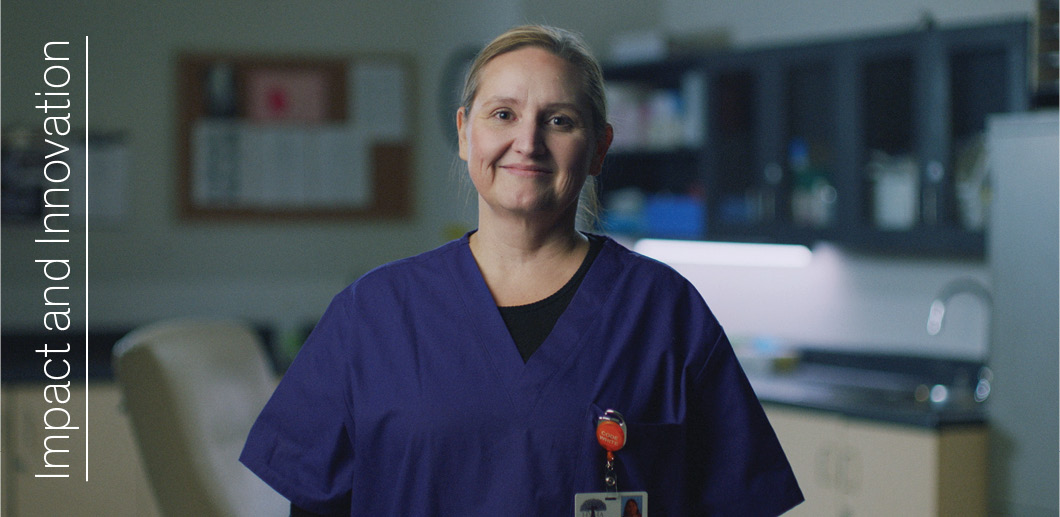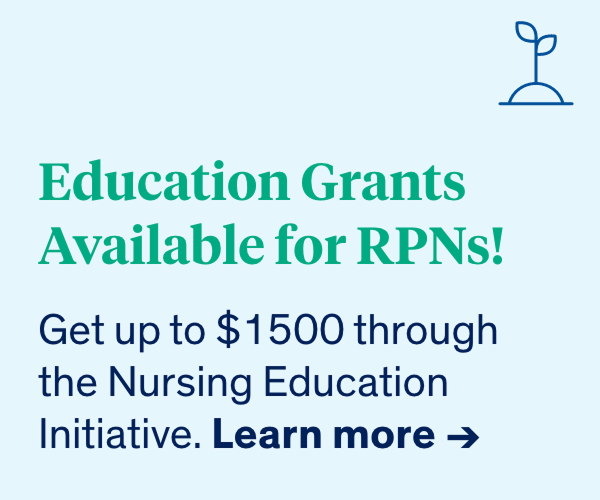In Fall 2019, WeRPN launched a new funding opportunity to support RPNs to lead quality initiative projects in their workplaces. RPNs from across Ontario were invited to submit project proposals focused on the theme of Joy in Work or Impact and Innovation.
A total of twelve RPNs, working with an executive sponsor from their organization, were approved for funding to implement their ideas over the course of 6-8 months. As part of the program, the RPNs also participated in a range of educational sessions to equip them with key knowledge and tools to support their project implementation. In addition, each participant was matched with one of WeRPN’s professional practice associates who provided ongoing coaching.
WeRPN connected with Kari Gray, who led an Impact and Innovation project, to discuss her program experience.
Tell us about your journey in nursing?
In 2005, my grandfather became ill with pancreatic cancer, and he was unable to access palliative or hospice care in his area. A person in his care team suggested I consider becoming a nurse after watching me take care of my grandfather. Five years later, I graduated from the Practical Nursing program at Fanshawe College.
I started my career with the Huron Perth Healthcare Alliance (HPHA) in 2010 and worked in their Seniors Mental Health for eight years. In 2019, I was transferred to the HPHA Helpline and Crisis Response Team and presently work there as a crisis worker.
What prompted you to apply for the WeRPN Impact and Innovation grant?
While I was working at the HPHA Seniors Mental Health team, a client of mine had utilized Medical Assistance in Dying (MAiD), but his family did not have access to MAiD-specific support and assistance.
While attempting to find MAiD support, I found out that the nearest bereavement support group, Bridge C-14, was in the Ottawa area. I approached HPHA’s Director of Patient Care to see if our hospital and mental health services would be able to provide the family with MAiD-specific support.
At the time, I mentioned the WeRPN Impact and Innovation Grant opportunity and introduced an idea to start a bereavement support group with a local family physician who provided medical assistance in dying procedures in Southwestern Ontario. Together, we reviewed the lack of resources in the area and realized that the families experiencing the unique grief that comes with medically assisted death felt left out.
Then, during the 2019 Nurses’ Week Celebration, one of the vice presidents at HPHA mentioned the hospital was interested in supporting my proposal.
I submitted my application to WeRPN and was informed my project was selected to receive a $10,000 grant to support implementation. I started the first support in Oct. 2019.
Can you describe the project?
The MAiD Support Group was a WeRPN project supported by HPHA, specifically, Mary Cardinal, VP of People and Chief Quality Executive and Kailyn Pasma, RN, Manager of Inpatient Medicine, Seniors Mental Health and Seniors Mental Health.
We provided MAiD-specific support to family members whose loved ones had died through MAiD. The group was an eight-week model based on the Grief Recovery Method and involved working through the Grief Recovery Method Handbook. Members completed homework and other exercises. We also discussed the language used while discussing MAiD and the grief felt after MAiD.
What was the process involved in developing this project?
There were several steps: obtaining consent and support from a Director of the hospital, finding a mentor, finding a team to work, preparing a detailed plan and proposal, submitting the proposal to WeRPN and finally executing the plan. During this time, I also received a Grief Recovery Method certification.
How did the project impact the families?
The families felt the support group helped them open the conversation about MAiD with their friends and families. The grief recovery method focuses on completing the relationship with the person who died rather than seeking closure. Closure can be interpreted as the relationship is over. Whereas completion allows a person to discover and communicate all that was unfinished in all aspects of the relationship.
The course ended around Christmas, but group members said they had learned coping skills to help them with their grief during the holidays. We became a close group.
What challenges did you face, and how did you overcome them?
For starters, finding appropriate space was a concern initially. After turning down a couple of options, we held the group at the hospital.
COVID-19 was also an obstacle, and because we could not hold face-to-face groups, and we were only able to convene one group.
Secondly, I was on the support team that helped with crisis debrief and grief support for a healthcare team comprised of physicians and a nurse practitioner tasked with making decisions about transitioning COVID-19 patients off the ventilator. I was specifically identified as a support due to the WeRPN grant.
What lessons did this project teach you on a personal and professional level?
Having created a support group for families grieving as a result of MAiD has given me the confidence to present an idea to the hospital’s senior leadership team. I have also been in consultations with the Canadian Nursing Association about bringing some changes to MAiD.
This initiative has encouraged me to be a part of the solution rather than just pointing out the problem and waiting for others to solve it.
What advice do you have for other RPNs hoping to create change in their organizations or communities?
Just do it! You’ll never know what you are capable of unless you put yourself out there. Share your idea with as many people as you can because you never know who might be in a position to help. I was at a fundraiser for a new hospice and chatting about my idea with a friend of a friend. She was the executive director of a hospice. She later invited me to the hospice to present my idea to the Board.

